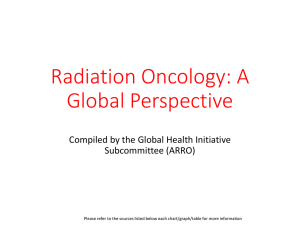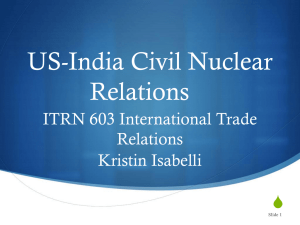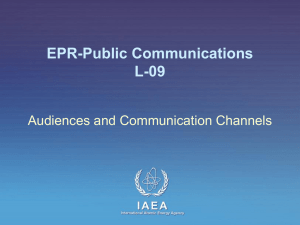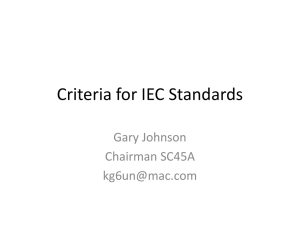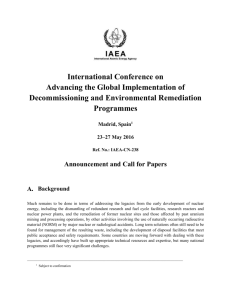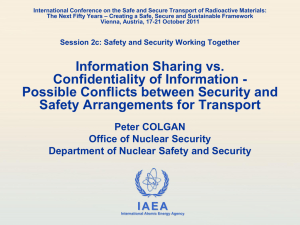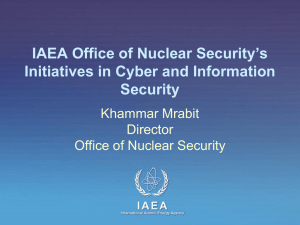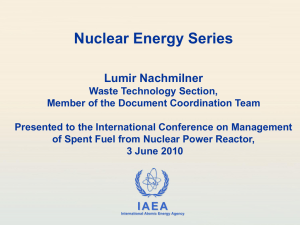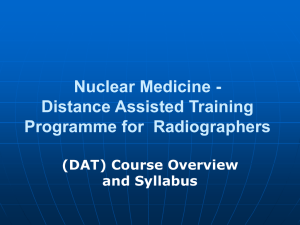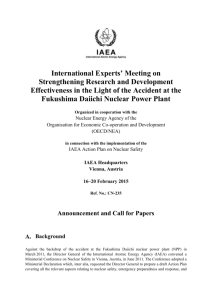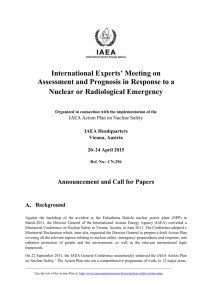Word file - International Atomic Energy Agency
advertisement
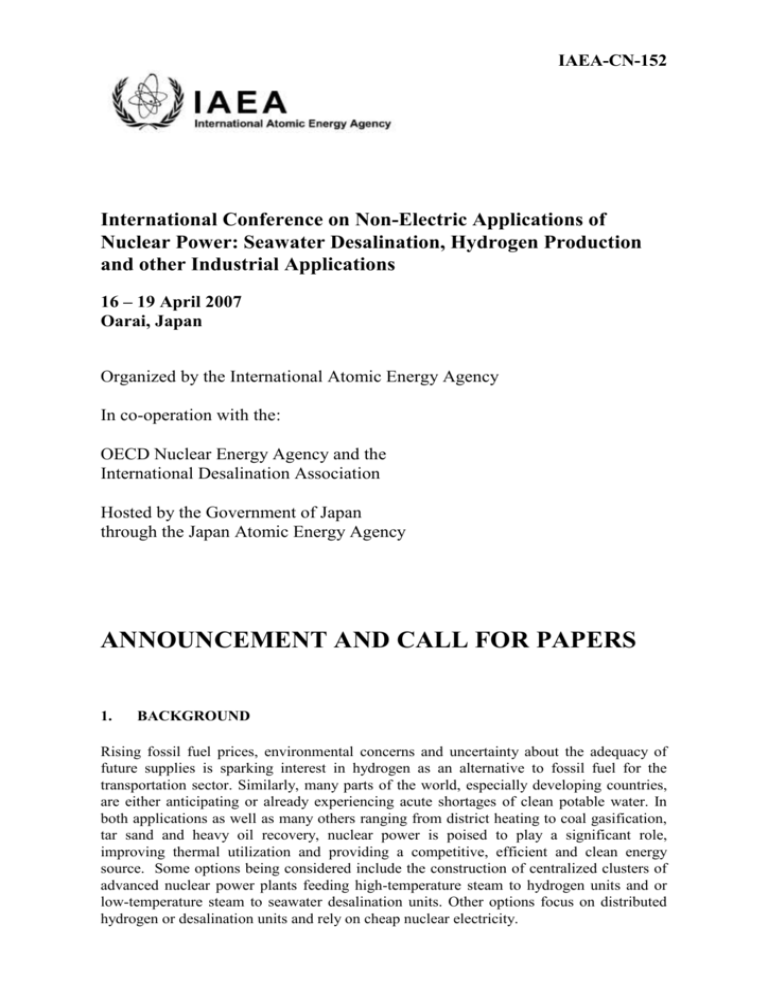
IAEA-CN-152 International Conference on Non-Electric Applications of Nuclear Power: Seawater Desalination, Hydrogen Production and other Industrial Applications 16 – 19 April 2007 Oarai, Japan Organized by the International Atomic Energy Agency In co-operation with the: OECD Nuclear Energy Agency and the International Desalination Association Hosted by the Government of Japan through the Japan Atomic Energy Agency ANNOUNCEMENT AND CALL FOR PAPERS 1. BACKGROUND Rising fossil fuel prices, environmental concerns and uncertainty about the adequacy of future supplies is sparking interest in hydrogen as an alternative to fossil fuel for the transportation sector. Similarly, many parts of the world, especially developing countries, are either anticipating or already experiencing acute shortages of clean potable water. In both applications as well as many others ranging from district heating to coal gasification, tar sand and heavy oil recovery, nuclear power is poised to play a significant role, improving thermal utilization and providing a competitive, efficient and clean energy source. Some options being considered include the construction of centralized clusters of advanced nuclear power plants feeding high-temperature steam to hydrogen units and or low-temperature steam to seawater desalination units. Other options focus on distributed hydrogen or desalination units and rely on cheap nuclear electricity. -22. OBJECTIVE OF THE CONFERENCE The objective of the conference is to update information on research and development work related to: 3. 1. Advances in nuclear hydrogen production and coupling to nuclear power plants 2. Advances in nuclear desalination and coupling to nuclear power plants 3. Advances in other nuclear process heat applications 4. Economic Assessment of process heat applications using alternative energy sources. MAIN TOPICS Track 1 Advances in nuclear power technologies with potential in non-electric applications a. Advances in evolutionary designs b. Advances in Generation IV designs c. Small & Medium Reactors (SMRs) and their potential for process heat applications Track 2 High-temperature process heat applications of nuclear power d. Advances in hydrogen technology systems e. Coupling aspects of nuclear hydrogen production f. Economics of nuclear hydrogen production g. Advances in other high temperature process heat applications Track 3 Low-temperature process heat applications of nuclear power h. Advances in desalination technologies i. Coupling aspects of nuclear desalination j. Economics of nuclear desalination k. Advances in other low-temperature process heat applications 4. PROGRAMME STRUCTURE The conference will consist of plenary sessions for topical areas deemed of general interest. Parallel sessions may be arranged for more detailed technical issues, related to specific applications such as hydrogen, desalination and other topics. There will be keynote presentations by invited speakers at the opening session and a panel at the closing session. Efforts will also be made to organize a poster session in addition to oral presentations. -3- 5. CONTRIBUTED PAPERS AND POSTERS All papers – other than invited review papers – must present original work and must not have been published elsewhere. (a) Submission of synopses Persons who wish to present a paper or poster at the conference must submit an extended synopsis (in English) of 800 words maximum (i.e. two A4 format pages of single spaced typing or the equivalent, including any tables or diagrams and a few pertinent references) on one of the topics listed under Section 3. The extended synopsis should be submitted together with the completed Form for Submission of a Paper (Form B), and the Participation Form (Form A) to the competent national authority for official transmission to the IAEA in time for them to be received by the IAEA by 1 November 2006. In addition, the synopsis must be sent electronically to the IAEA scientific secretariat, Ms. C. Czipin at C.Czipin@iaea.org . Authors are urged to make use of the Synopsis Template in Word 2000 on the conference web page (see Section 17). The specifications and instructions for preparing the synopsis and how to use the synopsis template are given in the attached instructions on “How to prepare the synopsis and how to submit it electronically”. Also attached is a “Sample Extended Synopsis”. The synopsis should give enough information on the contents of the proposed paper to enable the selection committee to evaluate it. Introductory and general matters should not be included. The synopsis – if accepted – will be reproduced in unedited form in the Book of Extended Synopses; the original must therefore be submitted as a camera-ready copy in a form in which the author will wish to have the work presented. The general style and presentation should be as in the attached sample. (b) Acceptance of Papers for Oral Presentation and Poster Presentation Given the number of papers anticipated and the need to provide ample time for discussion, the number of papers that can be accepted for oral presentation is limited. Authors who would prefer to present their papers in a poster session are requested to indicate this preference on Form A with which they send the extended synopses. Authors will be informed whether their papers/posters have been accepted for presentation on the basis of the extended synopsis. Guidelines for the preparation of the papers and the deadlines for their submission will be provided at that time. The IAEA reserves the right to decline to present or publish any paper that does not meet expectations based on the information in the extended synopsis. Further details about the preparation of papers and oral presentation at the conference will be sent to the authors of the papers accepted together with notification of acceptance. -46. STEERING COMMITTEE Chair Co-Chair Shiozawa, S. (JAEA, Japan) Omoto, A. (IAEA) Awerbuch, L. (IDA) Baranaev, Y. (IPPE, Russia) Chang, J.H. (KAERI, Rep. of Korea) Cleveland, J. (IAEA) Duffey, R. (AECL, Canada) Erp, V. (Consultant, USA) Faibish, R. (ANL, USA) Forsberg, C. (ORNL, USA) Gauthier, J.C. (AREVA, France) Hino, R. (JAEA, Japan) Hori, M. (NSA, Japan) Kendall, J. (Consultant, USA) Kim, S.H. (KAERI, Rep. of Korea) Kunitomi, K. (JAEA, Japan) Matzie, R. (Westinghouse, USA) Megahed, M. (NPPA, Egypt) 7. Methnani, M. (IAEA) Misra , B. (IAEA) Nisan, S. (CEA, France) Nordborg , C. (NEA, France) Pankratz, T. (IDA) Petri, M. (ANL, USA) Pickard, P. (SNL, USA) Rao, A. (IAEA) Sinha, R. (BARC, India) Sink, C. (DOE, USA) Shenoy, A. (GA, USA) Summers, W. (SRS, USA) Tewari, P. (BARC, India) Verfondern, K. (FZJ, Germany) Vitart, X. (CEA France) TECHNICAL TOUR A technical tour of the high temperature test reactor HTTR and the experimental fast breeder reactor JOYO, as well as the hydrogen production test facility is planned for Thursday, 19 April 2007. Participants wishing to take part in this tour should complete the visit proposal form available at the conference web site and email it to Mr. Tetsuo Nishihara, nishihara.tetsuo@jaea.go.jp by 12 January 2007. 8. EXPENDITURES No registration fee is charged to participants. As a general rule, the IAEA does not pay the cost of attendance, i.e. travel and living expenses, of participants. However, limited funds are available to help meet the cost of attendance of selected specialists mainly from developing countries with low economic resources. The grants awarded will be in the form of lump sums usually covering only part of the cost of attendance. Generally, not more than one grant will be awarded to any one country. -5- If governments wish to apply for a grant on behalf of one of their specialists, they should address specific requests to the IAEA to this effect. Governments should ensure that applications for grants: (a) are submitted by 1 November 2006; (b) are accompanied by a duly completed and signed Grant Application Form (as attached). Applications that do not comply with the conditions mentioned under (a) and (b) cannot be considered. The costs for the organization of the meeting are borne by the IAEA and the Host Government. 9. CONFERENCE PROCEEDINGS The proceedings of the meeting will be published by the IAEA as soon as possible after the conference. 10. DISTRIBUTION OF DOCUMENTS A preliminary programme of the conference will be sent to participants in advance. The final programme and the book of extended synopses will be distributed at registration. 11. WORKING LANGUAGE The working language of the conference will be English. 12. PARTICIPATION All persons wishing to participate in the conference are requested to register in advance online. In addition they must send a completed Participation Form (Form A) and if relevant, the Paper Submission Form (Form B) and the Grant Application Form (Form C) through the competent official authority (Ministry of Foreign Affairs or national atomic energy authority) to the IAEA. Participants will be accepted only if the Participation Form is transmitted through the competent official authority of a Member State of the IAEA or by an organization invited to participate. Participants whose official designation has been received by the IAEA will receive further information on the conference approximately three months prior to the conference. This information will also be posted on the conference website. -613. ACCOMMODATION Detailed information on accommodation and other conference related information will be sent to all designated participants well in advance of the conference. This information will also be available at the conference web site. 14. VISA Designated participants who require a visa to enter Japan should submit the necessary application to the nearest diplomatic or consular representative of Japan as soon as possible. Participants are recommended to refer to the conference web site where relevant information will be made available. 15. CHANNELS OF COMMUNICATION The Participation Form and as applicable, the Form for Submission of a Paper/Poster, and the Grant Application Form, should be sent to the competent national authority (Ministry of Foreign Affairs, national atomic energy authority) for official transmission to the IAEA. Subsequent correspondence on scientific matters should be sent to the Scientific Secretary and correspondence on administrative matters to the IAEA Conference Services Section. 16. CONFERENCE SECRETARIAT The address of the Secretariat is: International Atomic Energy Agency IAEA-CN-152 Vienna International Centre P.O. Box 100 Wagramer Strasse 5 A-1400 Vienna, Austria Telephone No.: +43 1 2600 (0) plus extension Telefax No.: +43 1 26007 Electronic mail: official.mail@iaea.org The Scientific Secretary of the IAEA Conference is Mr. I. Khamis, Nuclear Power Technology Development Section, Division of Nuclear Power (telephone extension 22810, e-mail address: I.Khamis@iaea.org ). Conference organization is provided by Ms K. Morrison, Conference Services Section, Division of Conference and Document Services (telephone extension 21317, e-mail address: K.Morrison@iaea.org ). 17. CONFERENCE WEB PAGE Please visit the IAEA conference web page regularly for new information regarding this conference: http://www-pub.iaea.org/MTCD/Meetings/Announcements.asp?ConfID=152
